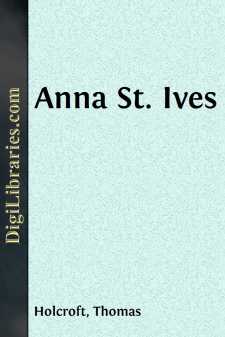Categories
- Antiques & Collectibles 13
- Architecture 36
- Art 48
- Bibles 22
- Biography & Autobiography 813
- Body, Mind & Spirit 138
- Business & Economics 28
- Children's Books 12
- Children's Fiction 9
- Computers 4
- Cooking 94
- Crafts & Hobbies 4
- Drama 346
- Education 46
- Family & Relationships 57
- Fiction 11821
- Games 19
- Gardening 17
- Health & Fitness 34
- History 1377
- House & Home 1
- Humor 147
- Juvenile Fiction 1873
- Juvenile Nonfiction 202
- Language Arts & Disciplines 88
- Law 16
- Literary Collections 686
- Literary Criticism 179
- Mathematics 13
- Medical 41
- Music 40
- Nature 179
- Non-Classifiable 1768
- Performing Arts 7
- Periodicals 1453
- Philosophy 64
- Photography 2
- Poetry 896
- Political Science 203
- Psychology 42
- Reference 154
- Religion 505
- Science 126
- Self-Help 81
- Social Science 81
- Sports & Recreation 34
- Study Aids 3
- Technology & Engineering 59
- Transportation 23
- Travel 463
- True Crime 29
Anna St. Ives
by: Thomas Holcroft
Description:
Excerpt
LETTER I
Anna Wenbourne St. Ives to Louisa Clifton
Wenbourne-Hill
Here are we, my dear girl, in the very height of preparation. We begin our journey southward at five tomorrow morning. We shall make a short stay in London, and then proceed to Paris. Expectation is on tiptoe: my busy fancy has pictured to itself Calais, Montreuil, Abbeville, in short every place which the book of post roads enumerates, and some of which the divine Sterne has rendered so famous. I expect to find nothing but mirth, vivacity, fancy, and multitudes of people. I have read so much of the populousness of France, the gaiety of its inhabitants, the magnificence of its buildings, its fine climate, fertility, numerous cities, superb roads, rich plains, and teeming vineyards, that I already imagine myself journeying through an enchanted land.
I have another pleasure in prospect. Pray have you heard that your brother is soon to be at Paris, on his return from Italy?—My father surprised me by informing me we should probably meet him in that capital. I suspect Sir Arthur of an implication which his words perhaps will not authorize; but he asked me, rather significantly, if I had ever heard you talk of your brother; and in less than five minutes wished to know whether I had any objections to marriage.
My father is exceedingly busy with his head man, his plotter, his planner; giving directions concerning still further improvements that are to be made, in his grounds and park, during our absence. You know his mania. Improvement is his disease. I have before hinted to you that I do not like this factotum of his, this Abimelech Henley. The amiable qualities of his son more than compensate for the meanness of the father; whom I have long suspected to be and am indeed convinced that he is artful, selfish, and honest enough to seek his own profit, were it at the expence of his employer's ruin. He is continually insinuating new plans to my father, whom he Sir Arthurs, and Honours, and Nobles, at every word, and then persuades him the hints and thoughts are all his own. The illiterate fellow has a language peculiar to himself; energetic but half unintelligible; compounded of a few fine phrases, and an inundation of proverbial wisdom and uncouth cant terms. Of the scanty number of polite words, which he has endeavoured to catch, he is very bountiful to Sir Arthur. 'That's noble! That's great your noble honour! Well, by my truly, that's an elegunt ideer! But I always said your honour had more nobler and elegunter ideers than any other noble gentleman, knight, lord, or dooke, in every thing of what your honour calls the grand gusto.' Pshaw! It is ridiculous in me to imitate his language; the cunning nonsense of which evaporates upon paper, but is highly characteristic when delivered with all its attendant bows and cringes; which, like the accompaniments to a concerto, enforce the character of the composition, and give it full effect.
I am in the very midst of bandboxes, portmanteaus, packing-cases, and travelling trunks....





